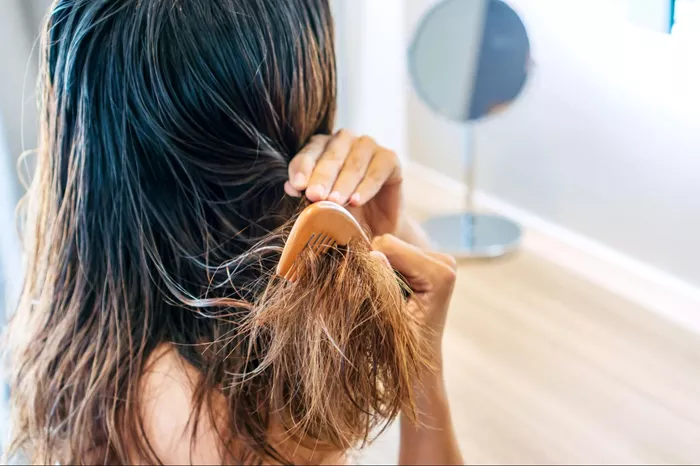Hair loss is a common concern for many individuals, impacting self-esteem and confidence. While genetics and health play significant roles, environmental factors can also contribute. One such factor is the quality of water used for washing hair. This article delves into the potential impact of dirty water on hair health and loss, exploring its effects and preventative measures.
Understanding Hair Loss
Types of Hair Loss
Androgenetic Alopecia
This is the most prevalent type of hair loss, often referred to as male or female pattern baldness. It is characterized by a gradual thinning of hair and is influenced by genetics and hormones. It usually begins at the temples or crown and can lead to complete baldness over time.
Telogen Effluvium
A temporary condition where hair falls out after stressful events, illness, or hormonal changes. In this type, a large number of hair follicles prematurely enter the resting phase, leading to noticeable hair shedding. This condition often resolves itself once the underlying cause is addressed.
Alopecia Areata
An autoimmune disorder that causes patchy hair loss. In this condition, the body’s immune system mistakenly attacks hair follicles, leading to sudden, localized hair loss. It can occur at any age and may affect individuals with a family history of autoimmune diseases.
Traction Alopecia
Caused by hairstyles that pull on the hair, such as tight ponytails or braids. Over time, the constant tension can damage hair follicles and lead to hair loss. It is particularly common among individuals who wear such styles regularly.
Causes of Hair Loss
Genetics
Family history can significantly influence the likelihood of hair loss. If one or both parents experienced hair loss, there is a higher chance that their children will also face similar issues.
Hormonal Changes
Hormonal fluctuations, especially those related to pregnancy, menopause, and thyroid issues, can impact hair growth cycles. Conditions such as polycystic ovary syndrome (PCOS) can also lead to increased hair loss due to hormonal imbalance.
Nutritional Deficiencies
Lack of essential vitamins and minerals, such as iron, vitamin D, and biotin, can weaken hair strands. A balanced diet is crucial for maintaining healthy hair growth.
The Role of Water Quality
What is Dirty Water?
Dirty water contains various contaminants that can harm hair health, including:
Sediments
Particles such as sand, clay, and silt can clog pores on the scalp. This buildup can prevent hair follicles from functioning optimally, hindering new hair growth.
Chemicals
Chlorine and heavy metals, such as lead and mercury, can accumulate in water sources. These substances can strip the hair of its natural oils and create an inhospitable environment for healthy hair growth.
Bacteria and Fungi
Microorganisms like bacteria and fungi can thrive in unclean water. These pathogens can lead to scalp infections, causing inflammation and hair loss.
How Dirty Water Affects Hair
Clogged Hair Follicles
Dirty water can lead to a buildup of product residue, oils, and dirt on the scalp. This buildup can clog hair follicles, preventing healthy hair growth and increasing the likelihood of hair loss.
Scalp Irritation
Contaminants in dirty water can irritate the scalp, leading to conditions such as dermatitis or psoriasis. This irritation can cause inflammation, which can disrupt the normal hair growth cycle and contribute to hair loss.
Weakened Hair Strands
Chemicals found in dirty water can strip hair of its natural oils and moisture. This results in brittle hair that is more prone to breakage and split ends. Over time, this damage can lead to significant hair loss.
SEE ALSO: Does Warm Water Cause Hair Loss?
Signs of Poor Water Quality
Symptoms to Look For
Itchy Scalp
A persistent itch may indicate irritation from contaminants. This can lead to scratching, which can further damage hair follicles and exacerbate hair loss.
Dull Hair
Hair that lacks shine may be a sign of damage from harsh chemicals or buildup from dirty water. Healthy hair should reflect light and have a natural luster.
Increased Hair Fall
Noticing more hair in your brush or on your pillow can be concerning. If hair loss occurs suddenly or in larger amounts, it may indicate an underlying issue related to water quality.
Dryness
Hair feeling excessively dry could be a result of poor water quality. Dry hair is more susceptible to damage and breakage, which can lead to further hair loss.
Preventing Hair Loss from Dirty Water
Solutions for Clean Water
Water Filters
Installing a water filter can reduce contaminants and improve water quality. Look for filters that specifically target chlorine, heavy metals, and sediments to ensure cleaner water for hair washing.
Regular Maintenance
Keeping plumbing systems clean and well-maintained is essential. Regularly check for leaks or buildup in pipes that could contribute to water contamination.
Use of Purifiers
Water purifying systems can effectively remove harmful substances. These systems can be installed at home and provide an additional layer of protection against contaminated water.
Hair Care Practices
Gentle Shampoo
Use shampoos free from harsh chemicals such as sulfates and parabens. These gentle formulas help maintain the scalp’s natural balance and prevent further irritation.
Deep Conditioning
Regular conditioning treatments help maintain moisture and repair damage. Look for products that contain nourishing ingredients like argan oil, coconut oil, or shea butter.
Scalp Care
Keeping the scalp clean and free from buildup is crucial. Consider using exfoliating scrubs or clarifying shampoos to remove residue and promote a healthy scalp environment.
Conclusion
In conclusion, dirty water can significantly impact hair health and contribute to hair loss through various mechanisms, such as clogged follicles, scalp irritation, and weakened hair strands. Recognizing the signs of poor water quality, including scalp itchiness, dullness, and increased hair fall, is crucial for addressing potential issues early. By implementing preventative measures such as installing water filters, maintaining plumbing systems, and adopting a gentle hair care routine, individuals can safeguard their hair against the damaging effects of contaminants. Ultimately, ensuring access to clean water is essential for promoting healthy hair growth and maintaining overall hair vitality.
You Might Be Interested In

